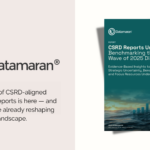- Risk-focused mindset dominates: 37% of IROs are negative impacts vs. only 13% as opportunities — a 3:1 ratio.
- CSRD reporting still maturing: Wide variability in disclosures, with most companies identifying only 6 of 10 ESRS standards as material.
- Climate, workforce, and conduct dominate boardroom focus: Nearly all companies report on E1 (Climate), S1 (Own Workforce), and G1 (Business Conduct).
European companies are leaning into risk mitigation over opportunity as they navigate the EU’s new Corporate Sustainability Reporting Directive (CSRD), according to new research by Datamaran. The report analyzes over 11,000 Impact, Risk, and Opportunity (IRO) statements from 304 companies across 57 industries and 21 countries.
The study finds that negative impacts outweigh opportunities nearly threefold — 37% of IROs were classified as negative, compared to just 13% marked as opportunities. This reflects a conservative interpretation of CSRD requirements, aligned with the principle of prudence.
“As the CSRD sets a new standard for transparency and accountability, our analysis shows that most companies are still building the muscle for continuous, data‑driven management,” said Marjella Lecourt-Alma, CEO and co-founder of Datamaran.

Climate Change (E1), Own Workforce (S1), and Business Conduct (G1) emerged as top priorities, appearing in 99%, 98%, and 92% of company reports, respectively. In contrast, topics like Affected Communities (S3), Water (E3), and Biodiversity (E4) were reported far less frequently, ranging between 36% and 44%.
Related article: Exclusive: 71% of Companies Strengthen Board Oversight Under CSRD – New Datamaran Survey
Despite CSRD’s emphasis on detailed reporting, the average length of sustainability disclosures remained static at 103 pages — nearly identical to the pre-CSRD average. However, the number of IROs disclosed varied widely, from 6 to 130 per company, with most falling between 25 and 45, highlighting inconsistent materiality thresholds across industries.
Additional insights include:
- Most companies (86%) did not include entity-specific IROs.
- On average, companies flagged 6 out of the 10 ESRS standards as material, suggesting broad—but selective—application of the double materiality principle.
- Maturity indicators like time horizons and value chain disclosures varied significantly across sectors.
Datamaran’s report provides a crucial benchmarking tool for executives, boards, and sustainability leaders as they work to align governance, strategy, and performance under CSRD.
“This report gives corporate leaders a valuable benchmark as they work to evolve from compliance to competitive advantage,” Lecourt-Alma added.
Click here to read the full report.
Follow ESG News on LinkedIn
The post Datamaran Analyzes 300+ CSRD Reports to Reveal Top Sustainability Risks and Priorities appeared first on ESG News.
